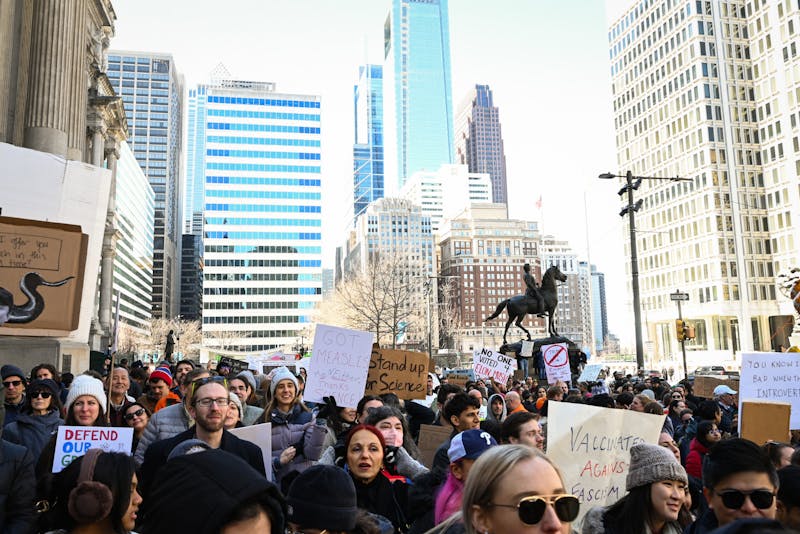
As Harvard University’s widely publicized affirmative action trial comes to an end, members of the Penn community and the rest of higher education are left to take stock of its findings.
The trial, which began on Oct. 15, unearthed previously confidential admissions secrets during its three-week run, including the preferential treatment of legacy students and children of wealthy donors. Many experts say these practices are widespread and that preferential treatment of legacy applicants exists at Penn, too.
At Penn, 25 percent of admitted students in the 2017 Early Decision pool were legacy students. This number is higher than most other Ivy League schools, including Dartmouth College, which accepted 16 percent, and Cornell University, which accepted 22.1 percent. Legacy students made up 16 percent of Penn’s undergraduate student body in 2017.
Andrew Belasco, CEO of college consulting firm College Transitions, said he thinks the trial has not unveiled any new information about the college admissions process.
"We always suspected that certain groups, such as athletes, legacy [applicants, and] children of major donors are given a significant edge in the admissions process," Belasco said. "In our experience, working with students who fall into one of those kinds of special interest groups, [they] are certainly given preference, whether it's in the form of appearing on something called the Z-list or something similar."
"I think all schools adopt strategies like this," he added.
Penn Dean of Admissions Eric Furda said he does not think the revelations from the trial should be surprising to most people.
“I don’t think it should be surprising to people that [the] Admissions Office should know who’s applying [to Penn], particularly if there is a deep connection to the institution,” Furda said. “But you don’t jump from that to: The students are admitted.”
The high-profile trial investigated accusations brought forward by the anti-affirmative action group Students For Fair Admissions, which claims Harvard discriminates against Asian American applicants based on race. Harvard has consistently denied the claim, stating that affirmative action is necessary to increase diversity.
The judge presiding over the case has yet to reach a final verdict, but the losing party will likely appeal to the Supreme Court. With the recent confirmation of Judge Brett Kavanaugh, the Court is currently majority right-leaning, which has sparked fears among many on the left that it may rule against affirmative action should the case reach SCOTUS. Furda previously told The Daily Pennsylvanian that admissions officers across the country — including those at Penn — could have to implement a drastically different admission process if that occurs.
Throughout the Harvard trial, however, Furda has remained adamant that Penn does not use discriminatory admissions practices:
“Penn Admissions considers many individual factors in the decision process including high school courses, grades, test scores, recommendations, personal essays, alumni interviews, background and experiences, and accomplishments. In the process, we do not discriminate against any racial, religious, ethnic or other group of applicants,” Furda wrote in an email statement to the DP.
Specific details revealed during the trial included the existence of a “dean’s interest list” of prioritized applicants, who are typically children of wealthy donors who have “already committed to a building." The “Z-list" was an example of admissions jargon that emerged as well, describing a list of mostly white legacy students with lower academic performance, who are usually the last to be admitted.
On Penn's campus, many student minority groups support affirmative action.
Asian Pacific Student Coalition Chair and College senior Soomin Shin said the plaintiffs in the trial are not representative of the diverse Asian population in America. Shin added that overall, many Asian Americans support affirmative action and holistic admissions policies.
“There are some people, Asian Americans, who are very vocal and they feel very strongly against affirmative action," Shin said, "but we have to keep in mind that that is a very small, but vocal minority, even within the Asian community."
United Minorities Council Chair and College junior Anisa Hasan-Granier said ruling against affirmative action would be a substantial loss for Penn.
“It's not that affirmative action is a perfect system, but it's pretty much the best that we can do right now,” she said. “I think one of the main points that people kind of miss out on in this whole affirmative action debate is that, it's not like there was a level playing field that affirmative action somehow messed up.”
Belasco and Brian Taylor, managing director of the college consulting firm Ivy Coach, both said they do not believe formally eliminating race from college applications will change much in the way students are admitted.
“They can't tell that Michael Chang is an Asian American applicant? Of course they can," Taylor said. “So, eliminating race in college admissions is not going to eliminate implicit bias, which is at the root of the discrimination that Asian American applicants face in admission not only to Harvard, but every Ivy League school.”
For now, Furda said Penn will remain steadfast in its current admissions policies.
The Daily Pennsylvanian is an independent, student-run newspaper. Please consider making a donation to support the coverage that shapes the University. Your generosity ensures a future of strong journalism at Penn.
Donate






